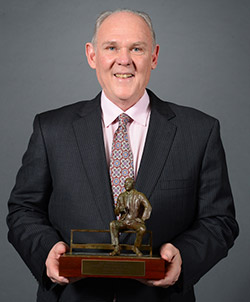Squamous Cell Carcinoma Survivor
NBA coach successfully defeats two bouts of cancer
 George Karl is the sixth-most winningest coach in National Basketball Association history, with more than 1,100 victories in a career that also includes 22 playoff appearances in 25 seasons. He guided the Seattle SuperSonics to the 1996 NBA Finals and most recently led the Denver Nuggets to nine straight postseason berths from 2005 to 2013. Selected as the NBA Coach of the Year in 2013, he is currently an analyst for ESPN.
George Karl is the sixth-most winningest coach in National Basketball Association history, with more than 1,100 victories in a career that also includes 22 playoff appearances in 25 seasons. He guided the Seattle SuperSonics to the 1996 NBA Finals and most recently led the Denver Nuggets to nine straight postseason berths from 2005 to 2013. Selected as the NBA Coach of the Year in 2013, he is currently an analyst for ESPN.
For all his success on the basketball court, Coach Karl found himself facing a formidable disease in 2005. He was diagnosed with prostate cancer at the age of 54 after an abnormally high prostate-specific antigen (PSA) test and confirmation by biopsy. He elected to have his prostate surgically removed and was subsequently cancer-free.
However, it was his second diagnosis in 2010 of Stage III squamous cell carcinoma of the head and neck that would push this intense, no-nonsense “player’s coach” to the edge of his physical, mental and even spiritual endurance.
“At that time of your life, you might think you’re invincible— and then you discover that you are not. But even prostate cancer didn’t wake me up as much as it probably should have,” he said.
The second cancer was discovered through a routine physical when his doctor examined a suspicious lump on his neck. “I kind of knew there was a lump there,” he explained. “But I was a fat guy with a lot of fatty tissue so I didn’t think too much about it.”
The cancer was located on his tonsil and had spread to the lymph nodes in his neck. Coach Karl had eight weeks of treatment that included the monoclonal antibody drug cetuximab (Erbitux) along with radiation for five days a week for seven weeks. He coached the Nuggets initially but left the bench as his treatment continued. His side effects became intense and included mouth sores, rashes, loss of taste and difficulty breathing.
“The treatment for my second cancer was very invasive,” he said. “You basically lose your ability to eat and I would get my feeding through a tube. There is also a fear that you are not going to be able to breathe because your throat feels like it’s swollen. I could see the pain in my 5-year-old daughter. She looked at me like I was a monster. She was scared to death of me.”
Toward the end of his treatment that spring, Coach Karl’s naturally positive outlook was flagging. “There were a lot of days where friends came to visit and they were afraid I wasn’t going to make it,” he said. “But I searched every day for something I could grab onto that I was going to get better.”
He credits his family and his friends with the encouragement to keep going, pushing him not to give up. “If you had asked me on July 1 (2010) if I was going to be coaching the next year, I probably would have said no,” he said. “But the organization was in favor of me trying to coach again.”
Coach Karl slowly recovered, and by the following October, he returned for three more years with the Nuggets. And his hard-fought recovery did not go unnoticed: He was awarded the Jimmy V Comeback Award for Perseverance at the 2010 ESPY awards. Then in 2013, he and his son, Coby, a thyroid cancer survivor, were given the Fighting Spirit Award by the Coaches vs. Cancer organization.
As he continued his recovery, he made lifestyle changes at work and at home and addressed the high stress level of professional sports. “If you’re going to be an NBA coach, you have to learn how to relieve that stress,” he said, “by breathing or meditating or exercising or being prayerful—whatever works for you.”
At home, Coach Karl and his partner, Kim, embraced substantial changes to their diet and consulted with a nutritionist who recommended a healthier, more organic diet that could reap benefits for his immune system. Four years later, he has kept the weight off, strives to maintain his healthy eating and said he feels better than he has for 10 to 15 years.
In 2012, he and Kim created the George Karl Foundation (www.georgekarlfoundation.org), and he has become an enthusiastic cancer advocate, especially in regard to improved education about cancer prevention.
“I wish I knew when I was 20 what I know now about my health,” he said. “Let’s educate people that many of their health issues can be solved with prevention.”


